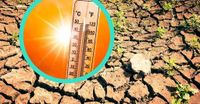Germany is bracing for an exceptionally long heat wave this summer, with dire implications for people, the environment, and the economy. Meteorologist Jan Schenk from The Weather Channel has revealed that initial weather models from the European Centre for Medium-Range Weather Forecasts suggest that high temperatures and persistent drought could extend well into autumn 2025. Experts are now eagerly awaiting further data that is expected to arrive in the coming days and weeks. If the forecasts hold true, the nation may face an unprecedented summer characterized by extreme heat and dryness.
The situation is already critical, as soils across Germany are suffering from drought. The Helmholtz Institute's drought monitor indicates that the lack of precipitation and high temperatures since the beginning of the year have led to increasingly desiccated soils. Hydrologist Dietrich Borchardt warned at the end of March that if the dry conditions worsen, a mega-drought could be on the horizon. Schenk echoed this sentiment, stating, "If the forecast is confirmed next week, then all of Germany should start preparing for this mega heat wave." This kind of heat wave would have severe repercussions for agriculture and water resources.
ZDF meteorologist Özden Terli added to the alarm, stating, "After a dry winter and spring, there is no sufficient rain in sight." He pointed out that the deficit in rainfall cannot be quickly rectified, and the recurring stable weather patterns are further drying out the air. This is not unexpected given the ongoing climate crisis. "Global warming is manifesting itself through extremes once again," Terli remarked, emphasizing that the atmosphere is not what it was 40 years ago, a reality that will lead to more frequent and severe weather extremes in the future.
As the summer approaches, the implications of this prolonged drought are alarming. The potential for crop failures looms large, with dry soils jeopardizing grain and vegetable harvests, which could lead to rising prices. Furthermore, forests and other ecosystems are also suffering from the stress of prolonged dryness.
Health risks are another significant concern. Heat waves increase the likelihood of circulatory problems, particularly among vulnerable populations such as the elderly, pregnant women, and those with chronic illnesses. The Robert Koch Institute estimated that around 3,000 heat-related deaths occurred in Germany during the summer of 2024 alone.
Water scarcity is also a pressing issue, with low water levels in the Rhine and Danube rivers potentially impacting shipping and power generation. The possibility of declining groundwater levels could threaten drinking water supplies in various regions. To address these challenges, experts suggest that households may need to implement restrictions, such as bans on lawn watering or filling swimming pools.
In a recent panel discussion, water expert Tobias von Lossow emphasized the concerning trend of water scarcity in Germany. "Germany used to be water-rich, but the situation has changed," he stated. "We are heading towards a water shortage that will increasingly challenge us." The loss of water in Germany is indeed dramatic, with approximately 2.5 billion tons of water lost each year, reflecting a global trend. Since the turn of the millennium, global soil moisture has decreased by around 2,600 billion tons, a development attributed to increasing drought periods, rising groundwater consumption, and climate change.
Despite these alarming forecasts, there are approaches to combat the impending water crisis. Borchardt noted that initial steps have been taken under the National Water Strategy to secure water supply during challenging times, such as opening additional water sources and improving regional connectivity. However, long-term measures will be necessary to address the underlying issues.
In agriculture, adopting water-saving cultivation methods like drip irrigation could significantly reduce water consumption. In urban areas, strategies such as unsealing surfaces, implementing green roofs, and adopting sponge city models could improve water retention and rainwater utilization. Environmental policies aimed at restoring wetlands, moors, and rivers not only help store water but also positively impact climate change.
As the summer of 2025 approaches, experts are closely monitoring the situation, hoping for updated forecasts that might alleviate some of the concerns. However, as Schenk noted, the current models indicate a potentially catastrophic summer ahead. "The only thing that might save us could be hurricanes disrupting the trend," he speculated. Nevertheless, he urged the public to prepare for an extremely hot summer, possibly starting as early as June.
In summary, the combination of high temperatures, prolonged drought, and the ongoing impacts of climate change poses a significant threat to Germany this summer. With the potential for severe consequences for health, agriculture, and water resources, the nation must take proactive measures to mitigate the effects of this looming crisis. As meteorologists continue to analyze the evolving weather patterns, the urgency for action has never been clearer.





